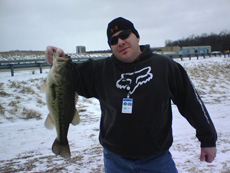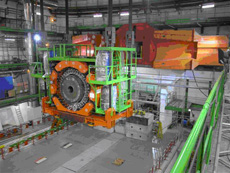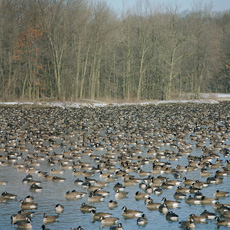Fishing in Fermilab's ponds: Come on in, the water's fine

Derek Plant took this photo of Bill Dymond catching a bass in the Main Injector pond on March 3.
Fermilab Today recently ran a picture of an employee with a large fish that piqued a reader's curiosity. It got him thinking about the low levels of tritium that were discovered in Fermilab ponds in 2005. The concentration of tritium in the surface water at Fermilab is well below the US Environmental Protection Agency standard for drinking water, but the reader wanted to know more about the fish: If the fish spent its whole life in the water, was it possible it might have built a higher concentration of tritium over time?
The answer is no, because tritium does not become incorporated into any part of the body. Bioaccumulation occurs when a certain compound is retained by an animal's tissue, usually the fat tissue. For example, mercury builds up inside salmon fat, and over time, the salmon has a much higher concentration of mercury than does the surrounding water. Another example is Strontium-90, a long-lived radionuclide that is not produced at Fermilab but is found in the environment as fallout from atmospheric nuclear weapons tests. Strontium-90 is chemically similar to calcium, and animals incorporate it into bones.
Tritium is different from both mercury and Strontium-90. An isotope of hydrogen, tritium binds to oxygen to make tritiated water. Tritiated water moves through organisms in the same way that normal water does. "So the concentration of tritium in fish is no different than the concentration in the surrounding water," said ES&H Section physicist Don Cossairt. "You can't concentrate water and you can't significantly concentrate tritium. Cooking the fish would drive the tritiated water out of the fish, so a person would consume an even lower concentration of tritium from eating the fish than from drinking the water that the fish swam in."
You can find a fact sheet about the low levels of tritium at Fermilab here.
If you decide to fish at Fermilab, keep the following in mind:
1. The Main Injector and Main Ring ponds are restricted to employees. They are not open to the public. The public is allowed to fish in the ponds in the public areas of the site.
2. You must have a valid Illinois fishing license. Illinois Conservation Officers occasionally make trips through the lab to check people's licenses.
3. The ponds are treated with an algaecide called Cutrine plus to control algal blooms. The agent is used in small amounts, and is deemed safe by the EPA. But you can avoid the chemicals by sticking to Swan Lake and the site's eastern lakes, such as the AE Sea. "The eastern lakes never get treated," said lab ecologist Rod Walton. "Just the edge of Swan Lake is treated occasionally, but that is usually done later in summer."
--Siri Steiner
|


